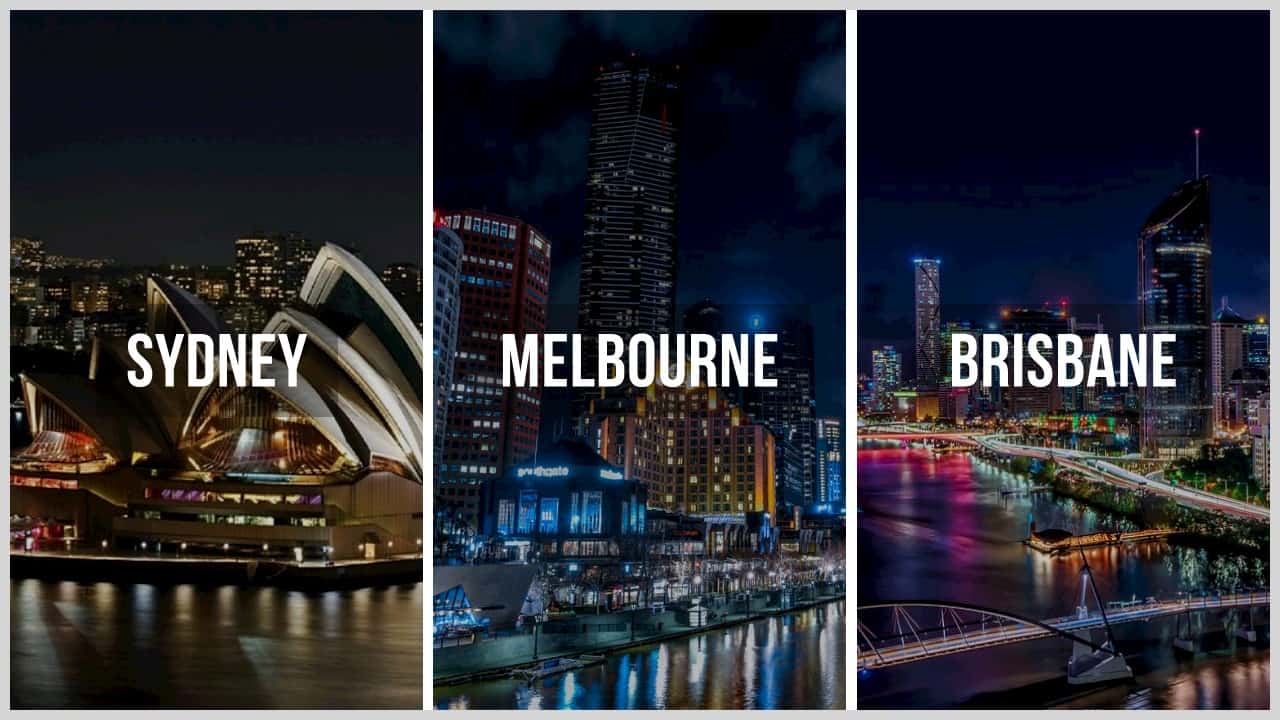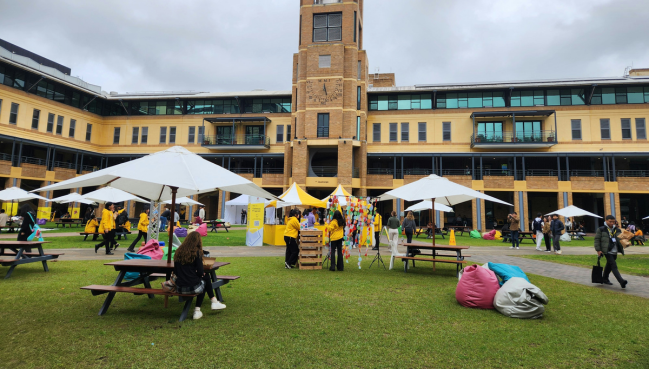The pros and cons of studying in Regional Australia and the city

We have been frequently asked by many overseas students “Should I study in a regional area or in the city in Australia?” So we went and explored various aspects of studying in the regional towns and city area. Let’s look at the pros and cons of studying in regional Australia and the city:
What are the Regional Areas in Australia?

Regional Australia is referred to as any area outside a metropolitan area.
Australian government is simplifying the definition of Regional Australia for various visa purposes. From November 2019, Regional Australia will include all of Australia except:
- Sydney
- Melbourne
- Brisbane
This means some cities (like Gold Coast, Perth, Canberra, Newcastle, and Wollongong) previously considered as cities will be included in the list of regional areas.
For migration purposes, the Department of Home Affairs has divided the whole of Australia into three main categories:
- Major Cities
- Cities and Major Regional Centres
- Regional Areas and Other Regional Centres
In this table below, we try to make it easier for the students to understand the new regional areas from 16th November 2019 and the benefits they can access when studying in these areas.
| Definition | Locations | Benefits |
| Major cities | – Sydney – Melbourne – Brisbane | – No access to any regional area incentives |
| Cities and major regional centres | – Perth – Adelaide – Gold Coast – Sunshine Coast – Canberra – Newcastle – Lake Macquarie – Wollongong – Illawarra – Geelong – Hobart | – Priority processing on regional visas. – Access to the Regional Occupations List – more jobs compared to non-regional lists. – International graduates with a bachelor or higher qualification from a regional campus of a registered institution will be eligible to access additional year in Australia on a post-study work visa |
| Regional centres and other regional areas | – Rest of Australia | – Priority processing on regional visas. – Access to the Regional Occupations List – more jobs compared to non-regional lists. – International graduates with a bachelor or higher qualification from a regional campus of a registered institution will be eligible to access additional 2 years in Australia on a post-study work visa – Priority in negotiating region-specific Designated Area Migration Agreements (DAMAs). |
The Commonwealth of Australia does not necessarily endorse the content of this publication.
Why the Australian Government made these changes?
As regional areas are generally less populated areas, that’s why the Australian Government is promoting and getting more people to move out in those areas.
It will not only help to build up those areas but also help to meet the shortage of the skills needed in the regional areas.
These changes will also mean that there will be less pressure on major cities like Sydney, Melbourne and Brisbane that has got a growing population.
Universities in regional areas
- Australian Capital Territory
Australian National University – Canberra
University of Canberra – Canberra
Australian Catholic University – Canberra
- New South Wales
Charles Sturt University – Wagga-Wagga, Port Macquarie, and Albury
Southern Cross University – Lismore and Coffs Harbour
University of Wollongong – Wollongong
University of New Castle – New Castle
The University of New England – Armidale
- Northern Territory
Charles Darwin University – Darwin
- Queensland
University of Sunshine Coast – Sunshine Coast
Central Queensland University – Rockhampton, Cairns, Gladstone, Noosa, Townsville, Emerald, Mackay, Bundaberg
James Cook University – Townsville
University of Southern Queensland – Toowoomba
Bond University – Gold Coast
Griffith University – Gold Coast
Southern Cross University – Gold Coast
- South Australia
Flinders University – Adelaide
University of Adelaide – Adelaide
University of South Australia – Adelaide
Carnegie Mellon University – Adelaide
Central Queensland University – Adelaide
- Tasmania
University of Tasmania – Hobart, Launceston, and Burnie
- Victoria
Australian Catholic University – Ballarat
Deakin University – Geelong and Warrnambool
Federation University – Ballarat
Latrobe University -Bendigo, Shepparton, and Wodonga
- Western Australia
The University of Notre Dame – Broome & Fremantle
University of Western Australia – Perth
Curtin University – Perth
Murdoch University – Perth
Edith Cowan University – Perth
Central Queensland University – Perth
City Area
Pros
Facilities
Australian cities are some of the most liveable cities in the world. The universities in the metropolitan areas are world-class and well known for their education, campuses, and facilities like libraries, computer labs, science labs, etc.
Lots of options for studying
There are thousands of courses that you can choose when studying in the metro areas. Most of the universities, Tafe and private range of study options that you may not be able to find in some regional areas.
Multicultural
Australian cities are very multicultural. You can see people from all walks of life, religions, backgrounds, and nationalities. Don’t get surprised if you bump into people from your home country.
More job opportunities
With larger populations, comes a huge number of job opportunities. As most overseas students look forward to some part-time work during their study period, it becomes the crucial factor for deciding where to study in Australia.
Easily accessible transport
Australian cities are really well connected with the different modes of transport like trains, trams, buses, and ferries. Most of the cities have multiple modes of transport which make going from home to school or work really easy and you don’t need to buy a car to travel around the city.
Entertainment
There are a large number of shopping centers, cinemas, restaurants, bars, and nightclubs in the cities for your entertainment. Apart from them cities will also hold various events like festivals, sporting events, etc.
Cons
Crowded
As mentioned above, the main reason the Australian Government is trying to push students and migrants to move to regional areas is due to cities like Sydney, Melbourne and Brisbane are getting overcrowded.
Population in these cities are booming which leads to congestion on the road, crowded public transport and shortage of rental properties.
Lots of competition
Although there are plenty of job opportunities available in the cities, there is stiff competition in the job market as most of the international students choose to study in city areas.
No additional points for migration purposes
If you are aiming to get additional points for the migration purpose, then cities are not going to be much help. There are no extra points for studying in the metro area.
Regional Area
Pros
Extra points for migration
One of the main reasons international students choose to study in regional areas is the obvious benefit of getting 5 extra points. These 5 points can be vital when applying for your permanent residence.
Additional year on Post Study Work Visa
As announced by the Australian Government, international students studying at regional universities will get one extra year of Post Study work visa. This visa allows the students to stay back in Australia after completing their studies for working full-time.
More Australian culture
You can see the real Tru-Blu Australian culture when leaving in regional towns. While Australian cities are very multicultural, Australian towns are opposite and have fewer migrants. You can get to see, live and experience the typical Aussie environment.
Relaxed lifestyle
The pace of life in Australian regional towns is much slower than the cities. People usually are not in a rush, so it might feel like you are on a vacation all the time. Even at work, people take a laid back approach and the workload is less stressful.
Cost of living
As a matter of fact, the cost of living in regional towns are much less compared to the cities. For example, while the rent for a 1-bedroom apartment costs around $1360 in Adelaide and it costs $2602 in Sydney.
Closer to Nature
If you like to bring closer to nature and love the outdoors, then studying in a regional area will be the best bet for you. Australia is a beautiful country with its very unique landscapes and wildlife.
Specialised courses
There are certain types of courses that are only available in regional areas. For example, the University of Tasmania’s Marine courses is the kind of one and only courses available throughout Australia.
Small class sizes
One of the key benefits of studying in a regional area is that class sizes are smaller as compared to cities. So, you get a personalised sort of education and its quite easy to build a relationship with your teachers and lecturers.
Special scholarships
Australian Government has announced a special scholarship, Destination Australia, for international students studying in regional universities. This scholarship will provide $15,000 per year to the students studying programs from Certificate IV level to Doctoral degrees.
Many universities also offer a variety of scholarships to attract more international students to study in the regional area. Make sure to enquire for scholarship before you apply for any course.
Community Feeling
When there is less number of students studying in your course, you can easily build a bond with them. It also helps to settle into the study and living environment quickly. Since most students might be living in the same areas, it is easier to catch up with friends after uni.
Cons
Fewer job opportunities
As most of the regional towns are smaller compared to larger cities, there can be a shortage of jobs in certain regional towns. As community aspect is really strong in regional areas, most of the employers prefer to give jobs to locals first.
Facilities
Infrastructure, lack of funding and less number of students mean that facilities in the universities are not as fancy as they are in city universities.
Lack of Public Transport
Public transport in regional areas is very limited. Usually, buses are the only mode of transport in regional towns with limited timetables. If you are not living close to university or work, then you will need to buy a car for your everyday commute.
Entertainment is limited
Regional towns are nowhere close to as lively as cities are. Most of the shops and shopping centers will close early and fewer number of options are available for dining out and events.
Our Top 10 regional cities for studying in 2020
Based on our research on various factors like:
- Cost of Living
- Lifestyle
- Liveability
- Availability of reputed universities and courses
- Facilities
- Job opportunities
Our Top 10 Cities for studying in Regional Australia are:
Final Verdict
While there are many pros and cons for studying in both regional and metropolitan areas in Australia, we suggest that you find one that meets your requirements well.
Some of the factors you should consider when making the final decision about studying in Regional Australia or city are:
- Your career goals
- Your financial situation
- Your preferred course
- Your lifestyle
- The reputation of the university or institution
- Cost of living
- Job opportunities
We hope this article helps you in making a better-informed decision for your career.



